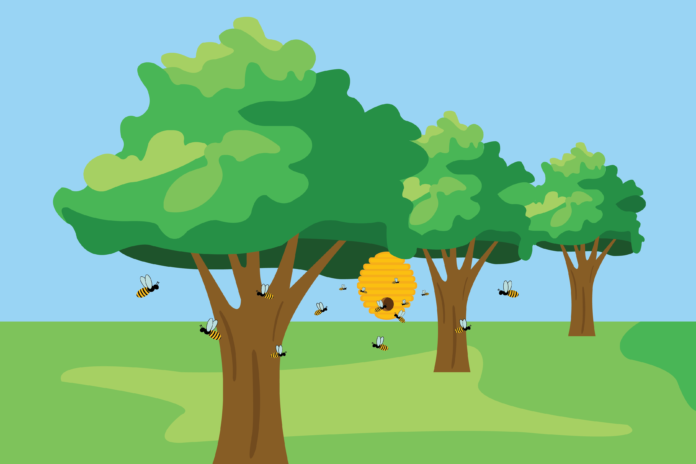Bee City USA aims to support pollination, raise awareness
In January of 2019, the City of Woodland was designated “as an official Bee City,” according to its website. In order to continue support for bees, Woodland recently “facilitated a pollinator-friendly Main Street beautification project,” according to the Daily Democrat.
In order to encourage pollination, Woodland’s Economic Development team has been working with the UC Davis Arboretum to develop a plan for planting more than 100 pollinator-friendly plants, through the Arboretum’s Learning by Leading program.
The beautification project consists of flowers planted across various spots in Woodland, such as at the “Welcome to Woodland” sign at the entrance of Main Street. In addition, compost has been added to the soil, mulch donated by C L Smith has been laid down, drought-resistant plants have been added and drip irrigation has been installed. The City of Woodland also worked with two artists who created a sunflower sign out of partly recycled metal, alongside a ceramic planter.
Through these changes, Bee City USA hopes to raise awareness about native pollinators, as well as encourage pollination.
Stephanie Burgos, who works in business engagement and marketing at the City of Woodland, explained the goal of the project.
“The main trigger for this project is our commitment as a Bee City USA to support our pollinators and create educational experiences about pollinators for our community,” Burgos said via email. “It was important for us when planning this project to ensure that we were using our local resources and talent.”
In addition, Molly Martin, the Bee City USA coordinator at the Xerces Society for Invertebrate Conservation, explained the impact that such projects can have.
“Projects like Woodland’s beautification project are a great way to raise awareness of the importance of native pollinators while also providing pollinators with the floral resources and nesting habitat that they need to survive,” Martin said via email. “It’s wonderful to see communities like Woodland creating pollinator habitat in such a visible area.”
According to Burgos, 2020 was supposed to be the “BIG” year for “our city to plan educational events to get the word about pollination to our community.”
Activities included “a pollinator workshop led by Xerces Society for Invertebrate Conservation,” a Water Wise Tour, in addition to the California Honey Festival along with others too. These events, however, have been postponed until 2021 as a result of sheltering in place due to the COVID-19 pandemic.
Despite this, “the Main Street relandscaping project is a visible way that our City team has launched efforts to support our pollinators,” Burgos said.
The project is currently nearing completion as of May 20 (which is also World Bee Day). There has not been any feedback from the community yet due to the community sheltering in place.
“However, several Downtown businesses have already approached us with positive feedback about the changes and are looking forward to seeing the plants grow and thrive in front of their businesses!” Burgos said.
Due to loss of habitats and exposure to pesticides, pollinator species have been undergoing large declines.
“Providing habitat rich in a variety of native flowering plant species and free from pesticides will help support these essential and declining species,” Martin said.
There are more than 20,000 species of bees worldwide, and 3,600 of these species are native to the United States, according to Martin.
Bee City USA focuses on conserving native species or native pollinators by “providing them with healthy habitat, rich in a variety of native plants, and free to nearly free of pesticides,” Martin said.
The general public is also able to help support these species in a variety of ways, such as by “planting native flowering plants,” using exposed and bare soil, using less herbicide and creating nesting areas. People can also help with scientific research by participating in a community science program by Xerces Society called Bumble Bee Watch.
The Main Street landscaping project in Woodland can help to raise awareness about pollination and spread awareness about native pollinators, which are declining in numbers, according to Burgos.
“It is our hope that our community will feel pride about the efforts that are made to support our pollinators and hopefully be inspired to introduce natives/pollinators into their own residential landscapes AND buy Woodland/local honey,” Burgos said.
Written by: Shraddha Jhingan — city@theaggie.org




